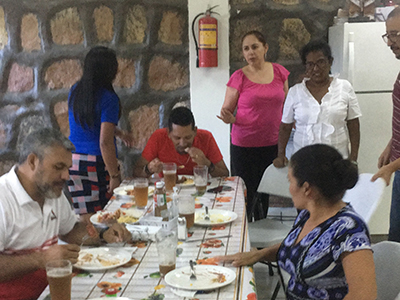Most Central American countries are experiencing severe political and economic instability, violence, corruption and social fragmentation. Yet, these same countries embody a colorful context packed with a cultural richness that surpasses understanding. Within this context, we see the complexity of forced migration resulting from fear and lack of opportunity. We need a church with a spirituality and doctrine that addresses and ministers with these communities and speaks to these issues.
Because of these challenges, we believe a renewal movement for congregational development is necessary, as is the case in Honduras. Thank God, what gave birth to the Methodist Church was a renewal movement in the 1700s, known as the Methodist Movement, from within the Church of England. As such, historically, we are familiar with renewal movements!
Your donations to The Advance helps support the work of Evangelism and Church Growth, Advance # 400400
John Wesley most often preached and ministered in the rough, violent places of his time, seeing and working from the goodness of people and communities. Honduras is one of the places Wesley would have visited in his ministry. One of the most violent regions of the world. Along with other countries in the region, it has become an alley for the trafficking of drugs and humans, gang violence and extreme poverty that feeds migration; at least in some localized regions.

Currently, most churches have home worship groups during the week, but we believe there would be more spiritual growth by adding other models for small groups, such as Class Meetings. We can understand the need to construct a church behind high walls, with cameras and guards. But a missionary, walking alongside the pastor, asks, “how do we serve the parish in mission,” a challenging concept for the church. How can the local church be a place to find stability amid the violence, unemployment, and extreme poverty, and at the same time, be a place for mission, which, by definition, means going outside the protective walls?
Pastors need qualitative data to understand the realities in which they serve. To ask the tough questions, we began a project using data on Sunday worship to can answer questions, such as: How are we ministering with children, women and the elderly? Is our church attendance increasing? Who is joining our congregation, new believers or “church hoppers?” How are we providing them with care and accountability to walk under the guidance of the Holy Spirit?
Finally, a menace that most our congregations in Honduras face is a cheap spirituality that provides magical answers to the above contextual challenges. Such religious competition is tempting, and some small-church pastors fall into the trap, at least partially.
To implement Class Meetings, we need to develop lay leadership beyond the pastoral family, and we need planning, organization and evaluation of the impact these small groups are having in the life of the people.
People immersed in rough and violent contexts need space to discern their walk toward holiness of heart and life. Are we living what we believe? How is it with my soul? Are we loving God and our neighbor? Creating these spaces for reflection and discernment may not be easy.
The implementation of Class Meetings for congregational development in Honduras may take a while, but every step is being evaluated and prayerfully considered as we ask tough questions to engage the world in mission.
excerpt from a story by Dr. Osias Segura-Guzmán, Global Ministries missionary and Edgar Avitia Legarda, regional representative for Latin America and the Caribbean with Global Ministries.
The Advance is the accountable, designated-giving arm of The United Methodist Church. The Advance invites contributors to designate support for projects related to the General Board of Global Ministries. Individuals, local churches, organizations, districts and annual conferences may donate to The Advance. One hundred percent of every gift to The Advance goes to the project selected by the giver. Gifts to missionaries support the entire missionary community.





